by Lindsay Eager
First of all, this is not a persuasive essay. I’m not trying to convert the uninterested to the world of musicals. There are many strong criticisms of this particular art form, and I tend to agree with many of them: musicals are cheesy, cringy, old-fashioned, irritable at times. Musicals require a suspension of disbelief beyond what many sci-fi movies ask of you. They’re too cheerful, and seem to exist in order to put a smile on your face and a bounce in your step—not everyone wants to experience such buoyancy, such light-heartedness, such vacant, howdy-do innocence.
I can understand and validate all of those points. And still.
I think there exists an ur-musical, floating around in the cultural consciousness, a musical that is the epitome of 1950s dimpled grins and tap-dancing, unbearably upbeat and full of cheap, false emotions and child actors, and that’s what many of us think of when we are asked to consider the musical. Is that what comes to mind for you, too? Some unholy combination of Oklahoma and Barney & Friends starring that one girl from your high school who treated every interaction like a scene rehearsal?
There are definitely musicals like that. But there are just as many musicals that defy their original genre trappings. They showcase the power of music, the contagion of emotion, and provide a complex mode of storytelling, and they’re worth taking a closer look at.
I’d like to address some key points about the musical and create a foundation for approaching this dynamic form of performance, and hopefully lead a few curious readers to a new show or two.
Musicals come in all forms, moods, and cheese-levels.
Just as if you were asked to explain what rock music is like, it’s difficult to explain what a musical is like. There’s so many variations! Musicals have their Steven Spielbergs, their Greta Gerwigs, their biopics, their Pixar films. If you’ve got a certain vibe that’s a must (or that’s off-limits) for you, you could easily find a corresponding musical to go with it.
Maximum Cheese Levels
These are musicals that are as close to the ur-musical as possible. We’re talking musicals that were produced in the 1940s and 1950s, which is also the time when movies became cheap, and therefore accessible, and therefore popularized. If you can handle the cheese, you might really find some gems here, as long as you brace yourself for the era-shock.
(Note: some of these are absolutely abhorrent when it comes to racism, sexism, homophobia, and ableism. Take care if you decide to partake of any of these.)
Seven Brides for Seven Brothers, West Side Story, Gypsy, Once Upon a Mattress, How to Succeed in Business Without Really Trying, and Singing in the Rain are all great shows with amazing singing and dancing (and fighting), even if they feature those moments where a character stares off into the distance and suddenly starts singing.

Less Cheese
These musicals still have plenty of singing and dancing, but the stories are more heavily grounded, and there’s tons of scenes that include dialogue and no songs. The songs often feel less “giant musical number” and a little more intimate, which can bring relief to viewers who are allergic to those big productions. Some of these have been adapted into beloved movies, as well, and are probably nostalgic for many viewers.
The Sound of Music, Thoroughly Modern Millie, Aida, West Side Story, Annie, Funny Girl, Cabaret, and Hair all have incredible soundtracks. Watching these shows live on a stage feels more akin to watching a play that occasionally breaks for music videos.
The Wes Andersons
You know what I mean when I reference Wes Anderson, right? Character-based, quirky, slower-paced and featuring unique views at odd pockets of life? If you’re into that, you might love Evita, Company, All That Jazz, Smokey Joe’s Café, Little Shop of Horrors, or The Last Five Years. These are all musicals that focus on the characters, a smaller situation, feature less giant dance numbers or over-the-top set designs, and utilize music that’s heartfelt and catchy while still being totally sincere.
The Tim Burtons
Again, you know what I mean here, right? Dark themes, edgy aesthetics, stories that center around quests and death and murder and larger-than-life worlds. If you’re into anything that’s currently on the merchandise at Hot Topic, you might find something to love about Pippin, The Rocky Horror Picture Show, Chicago, Sweeney Todd, or Beetlejuice.
The Michael Bays
If you come into a Michael Bay movie, you know you’re getting explosions, action sequences, robots, government conspiracies, all on a budget roughly the amount of some US states. I’m talking about musicals that know they are musicals, and as soon as you sit down in that seat, you should be prepared for visual effects, twisty-turny storytelling, a sense of escapism usually found in 80s fantasy movies, and plenty of cheese (but high budget cheese). Phantom of the Opera, Wicked, Children of Eden, Seussical, Hamilton… There are plenty of shows that fit into this category, and they’re hugely popular for a reason.
There are anti-musical musicals, like Avenue Q, Hadestown, Six, or Godspell. There are musicals that are so over-the-top, you almost have to see them to believe them—the Tommy Wisseaus of musicals—like Cats, Joseph and the Amazing Technicolor Dreamcoat, Les Miserables, Rent, Mamma Mia!
Have I made my point? There’s a musical for you out there somewhere, whatever your favorite flavor.
Understanding diegesis = understanding musicals.
A little vocabulary lesson for a moment. The word? Diegesis. What it means when we’re talking about musicals? A song that is diegetic is meant to be seen and heard by the characters in the story/musical/film. We, the audience, understand that the song we can hear is also being heard by the characters. An example of this is at the beginning of Wayne’s World when they listen to Queen’s Bohemian Rhapsody in the car. We know the characters are listening to this song within the context of the film because they are singing and headbanging to it—it is a diegetic song in this film.
An example of a non-diegetic song in a movie is… well, most movie scores. We, the audience, understand that Frodo Baggins is not actually being followed by an orchestra when he’s running from the Balrog in Moria, right? That music is there for the audience’s sake—to add atmosphere, tension, to heighten emotions, to help create the setting, and so forth.
Most musicals are not meant to be diegetic! When Annie arrives at Daddy Warbucks’ house and sings, “I think I’m gonna like it here!” we understand that a group of musicians has not suddenly arrived on the scene to accompany her impromptu song. Rather, we understand that the song is meant to encapsulate her feelings of excitement and indulgence as she tours the mansion where she’ll be staying.
Occasionally you’ll have musicals that bounce in and out of diegesis. In Phantom of the Opera, most of the songs are non-diegetic (meaning we, the audience, understand that they are not actually singing out loud to each other as a form of communication). But since the musical takes place in an opera, there are a few songs that happen on the opera stage within the musical, and those songs are being performed within the world of the musical. Think about Wayne’s World again—we know the final song that Cassandra sings on TV is actually being performed, right? But we know that when Dreamweaver plays in the background of the club where Wayne first sees Cassandra, he’s not actually hearing it. It’s giving us information about how he’s feeling as he falls in love.
If you can understand diegesis, you can understand how a musical functions—and you can hopefully de-cheese the experience for yourself. But there’s one point about musicals that you cannot strip away.
The melodrama is the point.
This is probably the biggest complaint about musicals—they’re so dang dramatic! (We’ll leave out the melodrama of musical lovers here, to save space.) You get a nice scene of dialogue going, and then the characters become so overwhelmed by their emotions that they have to burst out in song. Yes! That’s exactly the point!
A well-known axiom in musical theatre circles explains this so well: in a musical, when simple words aren’t enough, you sing; when singing isn’t enough, you dance. Musicals are about zooming right into the messy, flailing, exuberant moments in a character’s journey, and expanding them into a song. The music, then, is meant to be a metaphor, even in diegetic musicals. The music is the detailed sound and lyrics of whatever’s happening in the character’s mind and heart.
If you were to listen to a black metal album and exclaim, “My goodness, it’s so loud and chaotic!” as a criticism, well… you’d be landing on the exact aim of the album’s intention, only sideways. Musicals, as a format, are entrenched in heightened feelings. It explains why so many people who love musicals fell in love with them as teenagers, during a time when emotions are all in flux and tend to shift from second to second.
Of course, that’s also because…
At the heart of every musical is earnestness.
Even if a musical is about a dishonest character, or if it’s trying to utilize irony in its themes, a musical’s foundation is in earnestness. Sincerity. Perhaps that’s why it is a difficult art form for many people to sink their teeth into—all that intentional emotion is a lot to take in. Notice I didn’t equate cheerfulness or frivolousness to earnestness. Those are totally different things! Sweeney Todd is one of the darkest and most pessimistic stories I’ve ever seen, but every moment in the show is straightforward in its exploration of the human condition.
In a world full of media that loves sarcasm, voyeurism, and bad-faith derision for anyone who dares to say what they want or how they feel, it’s no wonder musicals often seem incongruous or even obsolete. But the world of self-expression needs earnestness, even if it’s cheesy, even if it’s melodramatic, even if it’s kind of awkward to witness. Hopefully you can find a musical that will work for you.
If you get the chance to see a musical live, make sure you grab your EARPEACE music earplugs. Our hearing protection won't interfere with the experience.




Share:
Music As Protest
4 Tips for Choosing the Right Motorcycle Helmet